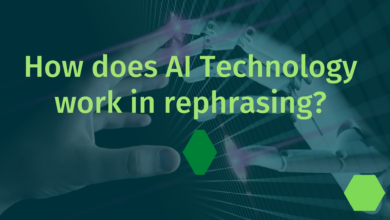How AI Is Enhancing Business Performance

By leveraging AI-powered analytics, companies can witness firsthand how AI is enhancing business performance through more informed decision-making and improved efficiency. In today’s fast-paced world, businesses face unprecedented challenges and opportunities. The rapid advancement of technology has led to a significant transformation in the way companies operate. One of the most promising and revolutionary technologies is artificial intelligence (AI).
Leadzen.ai is a prospecting tool that uses AI technology to automate the process of generating leads and connections. It provides real-time, accurate, and complete data, and helps users maximize the value of that data. This is a prime example of how AI can be utilized to enhance business operations and efficiency.
Artificial intelligence is a game-changer for companies of all kinds, not just a trendy term. In this article, we will explore how AI is enhancing business performance in a way that is easy to understand and relatable for everyone.
What is artificial intelligence (AI)?
Before diving into how AI is improving business performance, let’s first understand what AI is. Fundamentally, artificial intelligence (AI) is the creation of computer systems that can carry out operations that usually call for human intelligence. These tasks include making decisions, solving problems, comprehending natural language, and gaining experience.
AI encompasses various subfields, including machine learning, natural language processing, and computer vision, each with its unique capabilities and applications. By utilizing these AI techniques, businesses can automate processes, gain insights from data, and make more informed decisions.
Transformative Power of Artificial Intelligence in Boosting Business Success
Enhancing Efficiency with Automation
One of the most immediate and impactful ways AI enhances business performance is through automation. AI-powered systems can perform repetitive and time-consuming tasks with high accuracy and efficiency, freeing up human employees to focus on more creative and complex tasks.
AI-based chatbots, for instance, can handle customer inquiries and support requests 24/7, improving response times and customer satisfaction. This not only saves businesses money but also leads to better customer service, fostering loyalty and trust.
Data-Driven Decision Making
Data is a valuable asset for any business, and AI plays a crucial role in extracting actionable insights from the vast amounts of data generated daily. AI algorithms can analyze data at incredible speeds, identifying patterns and trends that might be otherwise missed by humans. This allows businesses to make data-driven decisions that can significantly impact their performance.
For example, retail companies can use AI to analyze customer purchase history and behavior to create personalized product recommendations. This can boost sales and customer engagement, as customers are more likely to buy products they’re genuinely interested in.
Improved Customer Engagement
AI’s ability to analyze data and understand natural language is a game-changer for customer engagement. With the help of chatbots and virtual assistants, businesses can interact with customers more efficiently and personally.
Chatbots can answer questions, provide information, and even process orders in real time. Virtual assistants like Amazon’s Alexa or Apple’s Siri can provide personalized recommendations and reminders, creating a more seamless and enjoyable customer experience.
AI-driven customer service also allows businesses to scale their operations without increasing costs. Instead of hiring more customer service agents, they can rely on AI to handle a growing number of customer inquiries effectively.
Enhanced Marketing and Sales
Marketing and sales are two areas where AI is having a profound impact on business performance. AI tools can analyze customer data to create highly targeted marketing campaigns. This means businesses can reach the right audience with the right message at the right time, increasing the chances of conversion.
For instance, email marketing campaigns can be personalized based on the recipient’s preferences and behavior. AI can also predict when a customer is most likely to make a purchase and send reminders or offers accordingly.
Furthermore, AI can help sales teams by providing predictive analytics. By analyzing historical sales data, AI can identify potential leads and even suggest the best sales strategies for specific customers. This leads to more successful sales outcomes and improved performance for the sales team.
Supply Chain Optimization
Efficient supply chain management is vital for businesses. AI can optimize the supply chain by predicting demand, streamlining inventory management, and ensuring timely deliveries. This lowers operating expenses while raising client satisfaction levels.
For instance, AI algorithms can analyze historical data, current market trends, and even weather forecasts to predict fluctuations in demand. This enables businesses to adjust their production and inventory levels accordingly, minimizing excess or insufficient stock.
AI can also enhance route planning for logistics, reducing fuel costs and delivery times. This is particularly beneficial for e-commerce companies and transportation services, as it can lead to significant savings and improved performance.
Related article: 5 best AI tools for taking meeting notes in 2023
AI in Healthcare
The impact of AI is not limited to the business world; it’s also making significant strides in healthcare. AI-powered diagnostic technologies have a remarkable ability to accurately evaluate medical pictures, including MRIs and X-rays. This can help doctors detect diseases and conditions at an earlier stage, leading to better patient outcomes and reduced healthcare costs.
AI can also assist in drug discovery and development by analyzing vast datasets to identify potential drug candidates. This can accelerate the research process and lead to the development of new medications.
Additionally, AI-driven electronic health records can streamline administrative tasks for healthcare providers, reducing paperwork and improving the overall patient experience. This is a win-win situation, as it allows healthcare professionals to focus on patient care, leading to better business performance and patient satisfaction.
AI in Finance
The financial industry has embraced AI for various purposes, including fraud detection, risk assessment, and algorithmic trading. AI algorithms can detect fraudulent activities by analyzing transaction patterns and flagging suspicious behavior in real-time.
Risk assessment is another critical area where AI can enhance business performance. By analyzing vast amounts of financial data and market trends, AI can provide more accurate risk assessments, enabling banks and financial institutions to make informed lending decisions.
Algorithmic trading is yet another example of how AI can be used to improve financial outcomes. AI-driven trading algorithms can analyze market data, identify profitable opportunities, and execute trades at lightning speed. This can lead to higher returns for investors and financial firms.
Challenges and Concerns
While AI offers numerous benefits for business performance, it also presents challenges and concerns that need to be addressed.
- Data Privacy: With the increased use of AI, there are growing concerns about data privacy. Businesses need to ensure that customer data is handled responsibly and securely.
- Ethical Considerations: AI systems can inadvertently perpetuate biases present in training data. It is essential to monitor and address these biases to ensure fair and ethical AI applications.
- Skill Gap: A skilled team is frequently needed for AI implementation. Businesses must invest in training their employees or hiring experts in the field.
- Initial Costs: Developing and implementing AI solutions can have significant upfront costs, which may be a barrier for small businesses.
- Reliability and Accountability: AI systems should be reliable and accountable for their decisions, especially in critical areas like healthcare and finance.
- Regulatory Compliance: Businesses must adhere to evolving regulations related to AI, such as data protection and algorithmic transparency.
Related article: AI Tools for Research: Empowering Your Academic Journey
Conclusion
Artificial intelligence is undoubtedly enhancing business performance across various industries. From automation and data-driven decision-making to improved customer engagement and marketing, the impact of AI is vast and transformative. Businesses that embrace AI technologies and adapt to the changing landscape will likely thrive in this new era.
However, it’s crucial for businesses to be mindful of the challenges and concerns that come with AI implementation. Responsible and ethical use of AI, along with a commitment to data privacy and regulatory compliance, is essential for a successful and sustainable AI-driven future.
Related article: Boost Your Academic Success with the Top 5 AI Tools for Students
As AI continues to evolve, it will open up new opportunities for businesses to innovate and improve their operations. By staying informed, investing in the right technologies, and fostering a culture of continuous learning and adaptability, businesses can harness the full potential of AI and enhance their performance in today’s dynamic marketplace.







